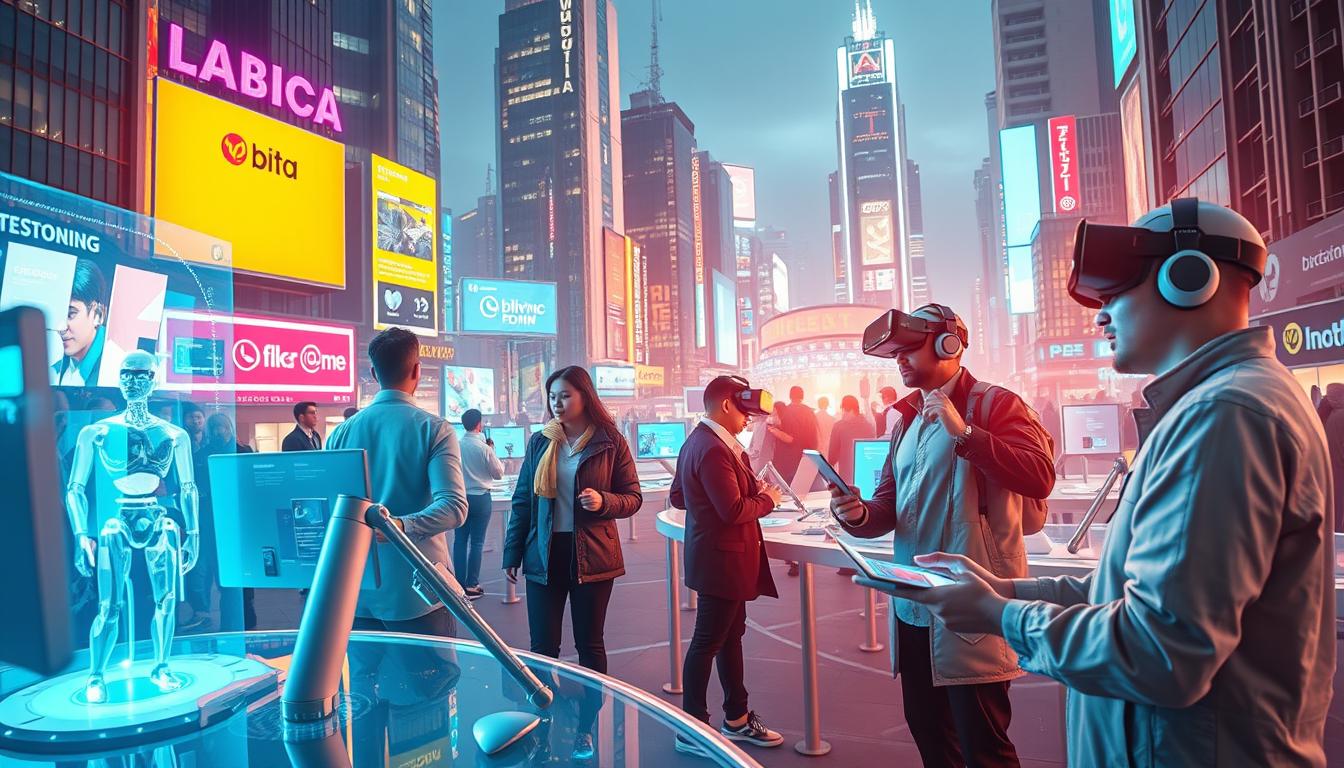Are you ready to unlock the potential of AI jobs? Artificial intelligence is changing the workforce, bringing new chances and challenges. By 2030, up to 375 million workers might need to change jobs or learn new skills because of AI1.
By 2025, AI could replace 85 million jobs but also create 97 million new ones. These new jobs will be in data analysis, software development, and cybersecurity1. The job market is changing fast, needing new skills and a proactive approach from everyone.
Starting a career in AI means learning new skills for the future. As companies use more AI, now is the perfect time to explore AI careers. Remember, 88% of tech companies now hire based on skills, not just degrees2.
So, it’s key for professionals to update their skills and experience. This will open the door to exciting AI job opportunities.
Key Takeaways
- The AI job market is evolving, presenting new career opportunities.
- By 2025, AI and automation could displace 85 million jobs but also create 97 million new roles globally.
- Continuous learning and upskilling are critical for adapting to changes brought on by AI.
- Skills-based hiring is on the rise, with many companies valuing practical skills over degrees.
- As AI continues to reshape industries, professionals must stay informed and agile in their career paths.
Understanding AI Jobs and Their Impact on Employment
The job market is changing fast, and AI jobs are at the heart of this shift. These roles involve working with artificial intelligence, leading to big changes in the job world. By 2030, AI could create 20-50 million new jobs worldwide, showing the vast opportunities in the AI job market3.
What Are AI Jobs?
AI jobs cover a wide range of roles that need expertise in different areas of artificial intelligence. You’ll find AI engineers, machine learning specialists, and data scientists among these roles. New positions like AI ethicists and human-machine teaming managers have also emerged, focusing on how technology and humans work together34.
Types of Roles in AI
- AI Engineer
- Data Scientist
- Machine Learning Specialist
- AI Trainer
- AI Ethicist
- Human-Machine Teaming Manager
These jobs come from different fields like tech, ethics, and management. Healthcare and education are expected to grow in AI jobs, while manufacturing might see fewer jobs3.
Skills Required for AI Positions
To do well in AI careers, you need certain skills. Knowing programming languages like Python and R is key, along with data analysis and machine learning. Soft skills like critical thinking and creativity are also important. These skills help you adapt to the changing AI job market and are valued by employers5.
The Growing Demand for AI Professionals
The job market is changing fast as AI becomes key in many fields. More people are needed to work with AI, thanks to new trends. Knowing these trends helps us understand the changing job world.
Industry Trends Driving AI Adoption
Many companies, up to 72%, are now using AI in their work6. By 2025, 41% of leaders think AI will change business processes a lot7. Also, 42% of executives want to teach AI bots to work right in businesses7.
Jobs related to AI are growing fast. In October 2024, AI jobs made up over 12.5% of all software jobs, Aura found8. Over four years, AI and machine learning jobs have grown by 74% each year8. Companies have also seen a 323% jump in hiring AI experts in eight years7.
Global Perspectives on AI Job Growth
AI jobs are expected to grow a lot worldwide. The US Bureau of Labor Statistics says AI jobs will grow by 21% from 2021 to 20316. Computer and information research jobs are also expected to grow by 15% each year8.
California, New York, Texas, Washington, and Massachusetts lead in AI job ads. Companies are spending more than 5% of their digital budgets on AI6. AI jobs now make up about 2% of all job ads in the US7.
In summary, the future of AI jobs looks bright. Many people see the need to learn more about AI to succeed7.
Essential Skills for a Career in AI
To succeed in today’s fast-changing AI world, you need both technical and soft skills. These skills help you tackle tough challenges and work well on new projects.
Technical Skills: Programming and Data Analysis
Knowing programming languages like Python, Java, and R is key for AI jobs. Skills in data analysis and machine learning are also crucial. They help you understand big data.
As AI grows, so does the need for machine learning skills. More than 60% of companies struggle to find the right people for these roles9. Also, knowing software engineering is important, with Data Scientists making about $96,000 in the U.S10.
Soft Skills: Communication and Problem-Solving
Technical skills are important, but soft skills are just as crucial. Employers want people who can explain complex ideas simply and work well with others. Being good at solving problems is also key, especially as AI gets more common in different fields.
As AI spreads across industries, being able to talk about AI ethics and fairness is important. It helps teams work better and projects succeed9. Developing these skills will help you play a big part in the future of work.
Navigating Career Paths in AI
Technology keeps evolving, opening many doors in AI for those ready to dive in. Starting with entry-level jobs in AI is key for newcomers. Roles like data analyst or junior machine learning engineer are great for beginners.
Entry-Level Opportunities in AI
Starting a career in AI is both thrilling and fulfilling. Entry-level jobs offer real-world experience that’s crucial for growth. Even without much experience, many companies seek candidates with potential.
Jobs like data analyst help you work with big data and find important insights. This skill is essential for any AI career.
Transitioning from Other Fields to AI
Thinking of moving to AI from another field? Highlighting your transferable skills is smart. Skills like analytical thinking and communication are just as valuable in AI.
Professionals from other fields can add AI skills to their current jobs. This helps bridge old and new industries. With AI’s growing demand, you can find opportunities in healthcare, finance, and more. For more on AI careers and skills, check out this article on AI’s job impact11.
The Role of Education in AI Careers
In the fast-changing world of artificial intelligence, getting an education in AI is key to success. Degree programs in computer science, data science, or AI are essential for starting your career. Many schools also offer special certifications for AI jobs to prove your skills.
Degree Programs and Certifications
Colleges and universities are now focusing more on AI and technical skills. This is to meet the growing need for AI skills in the job market. Getting certifications shows you’re serious about your career and gives you valuable skills that employers look for.
The University of Florida is leading the way in AI education. They’re working with companies to create opportunities for students to get involved in AI careers12.
Online Learning Platforms for AI Skills
Online learning platforms are vital for learning AI skills. Sites like Coursera and Udacity have courses to help you learn AI. They offer flexibility in your learning, helping you keep up with technology changes.
These platforms are important because AI is becoming more common in many industries. It’s crucial to keep learning and improving your AI skills over time1314.
Networking and Building Your AI Community
Building a strong network in AI is key to moving up in your career. Being part of the AI community helps you find jobs, improve your skills, and stay updated on trends. It also helps you navigate the changing world of AI and machine learning.
Joining AI Professional Groups
Joining AI groups is a great way to connect with others. Groups like the Association for the Advancement of Artificial Intelligence (AAAI) are perfect for meeting like-minded professionals. It’s not just about finding jobs; it’s about building relationships that offer mentorship and support.
Having a diverse network can also bring new ideas and solutions. This diversity is good for everyone involved15.
Attending AI Conferences and Workshops
Going to AI conferences and workshops is another good way to grow your network. These events bring together industry leaders, where you can learn and share ideas. You can make connections that inspire you and help you stand out in a competitive job market.
Statistics show that networking, like volunteering and collaborating, helps build a supportive community15.

| Role | Average Salary | Expected Job Growth (2022-2032) |
|---|---|---|
| AI Engineer | $113,000 | 23% |
| Machine Learning Engineer | $123,000 | 23% |
| Data Scientist | $127,000 | 23% |
| Software Engineer | $119,000 | 23% |
| Data Engineer | $104,000 | 23% |
| Robotics Engineer | $99,000 | 23% |
Adapting to new technologies through networking can boost your career. As job markets change, those who stay active in the AI community have an edge. They can become leaders who inspire others16.
The Future of Work: AI and Job Automation
AI is changing how we work. It’s making some jobs obsolete, but it’s also creating new ones. About half of the tasks done by workers could be automated soon17. This means people will have more time for creative and strategic work18.
How AI is Reshaping Traditional Roles
Automation is changing job roles fast. AI could replace 15% of the global workforce by 2030, affecting 400 million people17. In countries like the US and Japan, this number could be even higher, at 20 to 25%17.
Opportunities for Collaboration Between Humans and AI
The future of work also brings new chances to work with AI. Workers will team up with AI, creating new roles that use both human and AI skills18. Tools like ChatGPT can make work faster and better18. Companies need to teach workers how to work well with AI for a bright future.
| Impact of AI on Jobs | Details |
|---|---|
| Potential Job Displacement | 15% of the global workforce (~400 million workers) could face displacement by 2030 |
| Automation Capabilities | Approx. 30% of activities in 60% of occupations can be automated |
| New Job Creation | Additional labor demand could create 555 million to 890 million new jobs by 2030 |
| Collaboration Opportunities | Tools like ChatGPT can enhance worker productivity and efficiency |
With the right leadership and learning, the future of work can be exciting. Humans and AI can work together and succeed.
Preparing for AI Job Interviews
Getting ready for AI job interviews means focusing on your technical skills and project experience. Knowing what these interviews are like can really help you stand out in the fast-changing AI world.
Common Interview Questions in AI
When you’re getting ready for AI interviews, you’ll face questions about your AI knowledge and how you use it. You might talk about:
- Your experiences with AI tools and frameworks.
- How you handle AI challenges in real scenarios.
- Your past AI projects, what you did, and how you helped.
- How AI changes industries like finance and healthcare.
By 2024, more companies might use AI for interviews, making it even more competitive19. They might use AI to narrow down candidates, which could miss out on great talent19.
How to Showcase Your AI Projects
Showing off your AI projects well can really help in interviews. Make sure to cover these points:
- The problem you tried to solve.
- What you hoped to achieve.
- The AI methods you used.
- The results and what you learned.
Using keywords from the job ad in your answers can show you fit the job19. Sharing real examples proves your skills and shows you’re ready for in-demand roles like machine learning engineers and AI consultants20.

| Project Element | Description |
|---|---|
| Problem | Clearly state the problem your project solves. |
| Objective | Define your objectives for the project. |
| Methodology | Explain the methods and technologies used. |
| Outcome | Summarize the results and lessons learned. |
As AI changes how we hire, getting to know AI project presentations and practicing can improve your interview skills2019.
Adapting to the Evolving AI Landscape
In the fast world of artificial intelligence, being adaptable is key to success. Keeping up with AI changes means being proactive. Look into online courses and webinars to learn about new tech and methods. Sites like Coursera and Udacity have many AI courses to help you stay ahead in the job market21.
Staying Updated with AI Innovations
Joining professional communities online and offline can really help you understand AI better. Working with others not only boosts your knowledge but also opens doors for networking. With the AI market valued at about $196 billion, being part of innovation discussions is vital22.
Continuous Learning and Professional Development
Learning about AI is crucial, especially since over 60% of workers might need to retrain by 202722. Getting certifications in areas like cybersecurity or AI development can give you the skills you need. Combining technical skills with soft skills like critical thinking and empathy makes you stand out in a job market that values both human and machine collaboration21.
FAQ
What types of roles are available in the AI job market?
What skills do I need to pursue a career in AI?
How can I transition from another field to an AI career?
What are the educational requirements for AI jobs?
How can I network within the AI community?
What types of companies are hiring AI professionals?
How do I prepare for an interview in an AI role?
Why is continuous learning important in the AI field?
Source Links
- AI and the Workforce: Preparing for the Jobs of the Future | Thoughtful – https://www.thoughtful.ai/blog/ai-and-the-workforce-preparing-for-the-jobs-of-the-future
- How AI And Skills-Based Hiring Are Reshaping The Job Market – https://www.forbes.com/sites/karadennison/2024/10/14/how-ai-and-skills-based-hiring-are-reshaping-the-job-market/
- Innopharma Education Blog – https://www.innopharmaeducation.com/our-blog/the-impact-of-ai-on-job-roles-workforce-and-employment-what-you-need-to-know
- 4 Ways AI Impacts the Job Market & Employment Trends – https://onlinedegrees.sandiego.edu/ai-impact-on-job-market/
- How Is Artificial Intelligence Impacting the Job Market? – https://www.linqto.com/blog/how-is-artificial-intelligence-impacting-the-job-market/
- Jobs That Are Growing With the Rise of AI – https://partnerstack.com/articles/ai-job-growth
- AI-Skilled Workers Are The New, Hot, In-Demand Professionals – https://www.forbes.com/sites/jackkelly/2024/08/01/ai-skilled-workers-are-the-new-hot-in-demand-professionals/
- AI Jobs: Key Roles Shaping the Future of Technology – https://blog.getaura.ai/ai-jobs
- The Top Skills You Need for AI Jobs in 2024 — Multiverse – https://www.multiverse.io/en-US/blog/top-ai-skills
- Top 10 Jobs in AI and the Right AI Skills [2024] – https://www.simplilearn.com/top-artificial-intelligence-career-choices-and-ai-key-skills-article
- AI & Your Career Development – Office of Career and Professional Development – https://giesgroups.illinois.edu/bcs/how-to-use-ai-in-your-career-development/
- AI in Careers – Career Connections Center – https://career.ufl.edu/about/ai-in-careers/
- The role of AI in education and the changing US workforce – https://www.brookings.edu/articles/the-role-of-ai-in-education-and-the-changing-u-s-workforce/
- The Importance of Education and Workforce Development in the AI Era – https://www.linkedin.com/pulse/importance-education-workforce-development-ai-era-jarrod-anderson-listc
- “Networking: The Secret Weapon for Career Success in the AI Era” – https://www.linkedin.com/pulse/networking-secret-weapon-career-success-ai-era-mohit-uppal
- AI and the Future of Actually Getting a Job – https://dev.to/ben/ai-and-the-future-of-actually-getting-a-job-4ei
- AI, automation, and the future of work: Ten things to solve for – https://www.mckinsey.com/featured-insights/future-of-work/ai-automation-and-the-future-of-work-ten-things-to-solve-for
- The future of work: How will AI and automation affect work? – https://www.uc.edu/news/articles/2023/05/the-future-of-work–how-will-ai-and-automation-affect-work.html
- Your next job interview might be with AI. Here’s how to ace it. – https://www.cbsnews.com/news/ai-job-interview-tips-to-prepare-artificial-intelligence/
- Your Guide to Preparing for Future Careers With a Focus on AI – https://vidcruiter.com/blog/ai-job-market/
- AI and the Future of Work: Adapting to a Changing Job Market – https://www.linkedin.com/pulse/ai-future-work-adapting-changing-job-market-arpit-apoorva-sdi5f
- Rise of AI: Graduates and Evolving Employment Landscape | Volt – https://voltedu.com/insights/graduates-and-evolving-employment-landscape/



